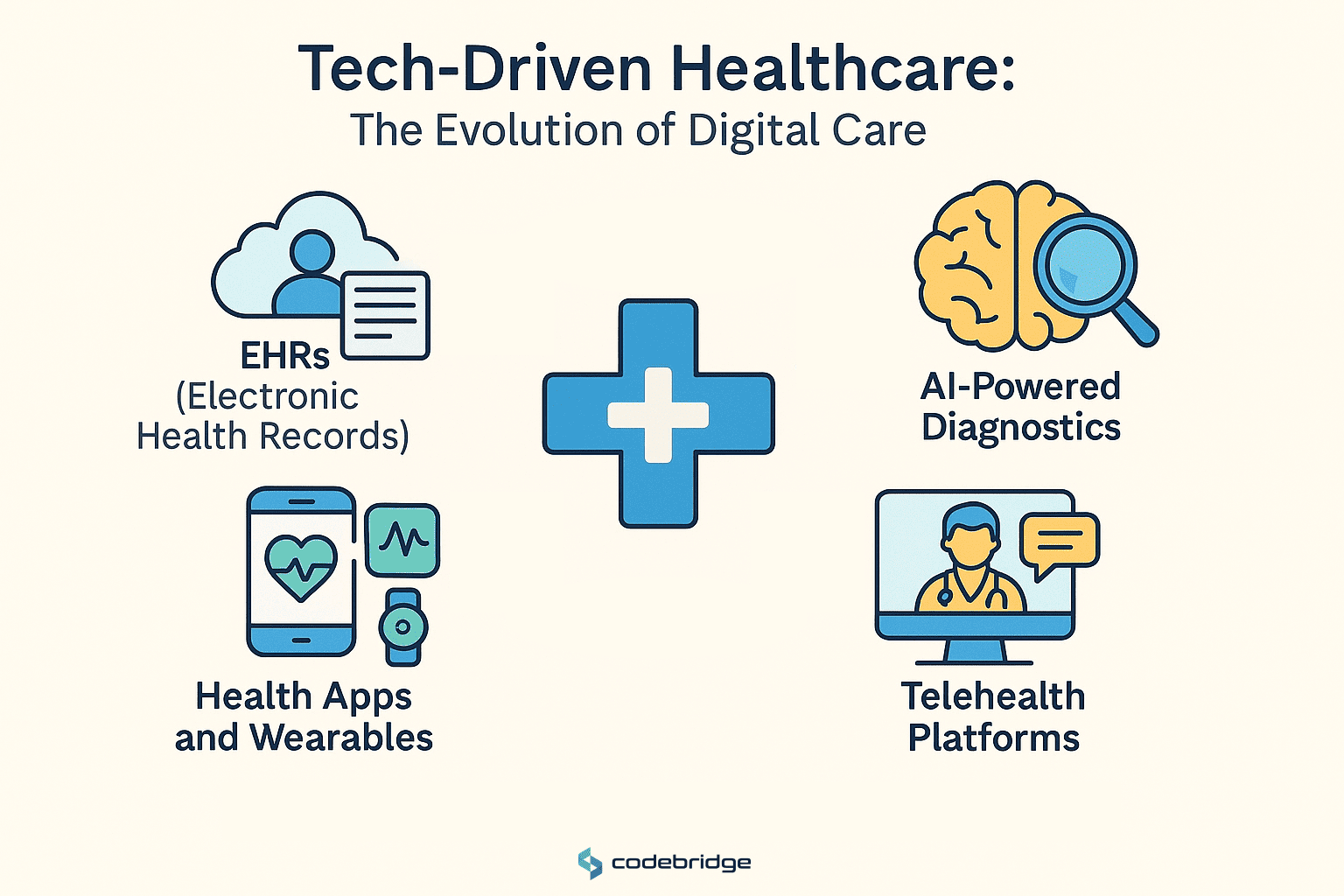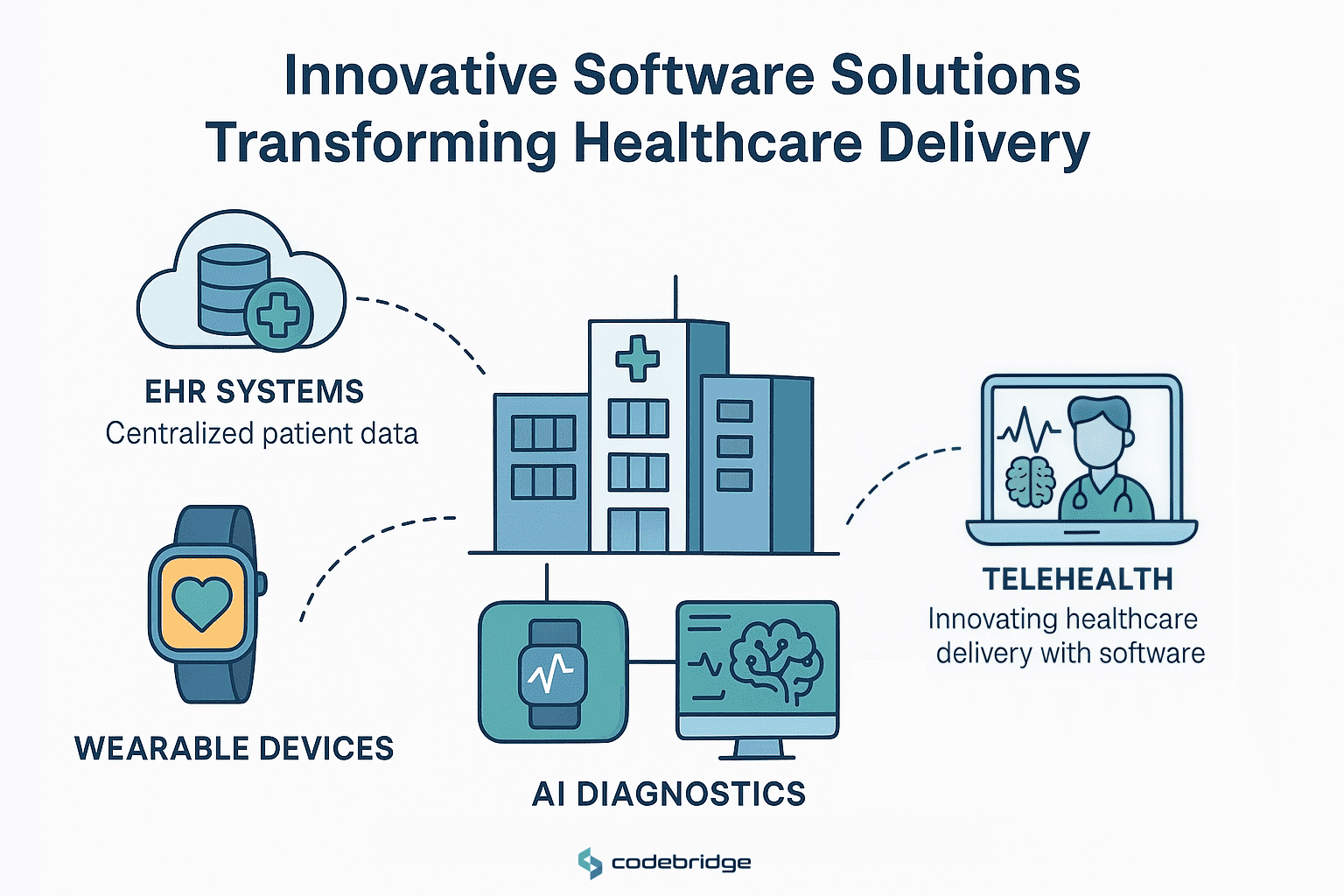Software engineering in healthcare isn’t merely about clean code or system uptime; it’s the skeletal framework and neurological core of modern medical innovation. It’s not just technical; it’s deeply strategic, a convergence of logic and lifesaving utility. And for startups attempting to dance their way into this tightly regulated, outcomes-driven domain? It’s not optional. It’s everything.
Think of it this way: we’re no longer coding for convenience, we’re engineering for survival, for scale, for real-time remote diagnostics and AI-infused decision engines that sift through terabytes of clinical data in milliseconds. Meanwhile, security protocols become more than defensive walls; they’re ethical imperatives. Privacy compliance isn’t a feature; it’s a foundational expectation. One wrong line of code could compromise lives or cost a startup its existence.
Hospitals, healthtech industry disruptors, and data-driven care platforms aren’t just adopting software; they’re becoming software. From the orchestration of telehealth ecosystems to frictionless EHR integrations and automated compliance workflows, the lines between technology and treatment have blurred to near-erasure.
For startup leaders? Understanding software engineering in this context is akin to knowing the blood type of your business model. You don’t just need to build, you must anticipate, validate, secure, and scale, all while navigating labyrinthine regulatory landscapes and user bases whose stakes include mortality.
%20(1).png)
Understanding the Role of Software Engineering in Healthcare Innovation
Software engineering applies systematic, disciplined, and quantifiable approaches to the development, operation, and maintenance of software systems. In healthcare, it’s the backbone of digital transformation, empowering providers and patients through technology that makes healthcare more efficient, accessible, and personalized.
According to Grand View Research, the global healthcare Software-as-a-Service (SaaS) market was valued at USD 25.13 billion in 2024 and is projected to reach USD 74.74 billion by 2030, growing at a CAGR of 20.0% from 2025 to 2030. This rapid expansion highlights how essential cloud-based software engineering has become in healthcare innovation and scalability.
The Intersection of Technology and Healthcare: The Role of Software Engineering
Healthcare is no longer confined to hospitals and clinics. Thanks to healthcare software development, the industry now spans mobile apps, cloud platforms, IoT-connected devices, and virtual care environments. And behind all this innovation? Skilled software engineers who blend medical knowledge with cutting-edge tech.
Key intersections where software engineering meets healthcare include:

- Electronic Health Records (EHRs): Centralizing patient information for easy access and improved coordination.
- Health apps and wearables: Delivering real-time health tracking and personalized care.
- AI-powered diagnostics: Enhancing early detection and treatment accuracy.
- Telehealth platforms: Expanding access to care regardless of location.
Engineers in this space are solving problems that were once thought unsolvable, bridging the gap between medical expertise and digital capabilities.
Key Areas Where Software Engineering Drives Healthcare Innovation
Startups and enterprises alike are increasingly investing in healthcare technology solutions that are driven by software. Here are some core areas where software engineering is making a major impact:
- Patient Engagement & Monitoring: Through intuitive mobile interfaces and wearable integration, patients are more involved in their health than ever before.
- Interoperability & Integration: Software allows disparate systems (labs, pharmacies, insurers) to communicate, improving continuity of care.
- Automation & Workflow Optimization: Administrative burdens like scheduling, billing, and reporting are being streamlined through customized platforms.
- Data Analytics & Population Health Management: Software captures and analyzes big data to predict health trends and inform policy decisions.
Startups focused on these areas are not just creating new tools; they’re creating value, driving innovation, and reshaping the entire healthcare ecosystem.
How Software Engineering Enhances Patient Care and Healthcare Delivery
At its core, healthcare is about people. The success of any technology in this field is measured by its impact on patient outcomes. Software engineering has the power to improve every aspect of the patient journey, from initial consultation to recovery and beyond.
Improving Patient Care with Data-Driven Software Solutions
Modern healthcare thrives on data. From vitals and diagnoses to medications and lifestyle habits, the amount of patient information available today is staggering. The challenge? Turning that data into actionable insights. That’s where software engineering steps in.
Key software-driven improvements:
- Clinical Decision Support Systems (CDSS): Help clinicians make data-backed decisions in real time.
- Predictive analytics: Identify at-risk patients early to prevent complications.
- EHR integration: Provides a 360-degree view of patient history, medications, and test results.
These innovations reduce human error, streamline care delivery, and lead to better outcomes. They also empower patients by giving them access to their own records, fostering transparency and engagement.
Telemedicine and Remote Monitoring: A Software-Driven Revolution
The rise of healthcare app development has fueled a new era of care: virtual, convenient, and accessible. Especially post-pandemic, telehealth is no longer a luxury, it’s a necessity. And it’s entirely driven by software.
Examples of software-enabled telehealth innovation:

- Real-time video consultations between patients and providers.
- Remote patient monitoring (RPM) using IoT devices and apps.
- Chatbots and AI assistants that provide 24/7 support or triage services.
These technologies don’t just improve access; they reduce hospital overcrowding, cut costs, and enable proactive care. For startups, developing scalable telemedicine platforms is a high-impact entry point into the healthcare space.
How Software Engineering Supports Healthcare Startups in Scaling Operations
Healthcare startups face immense pressure, from ensuring regulatory compliance to delivering seamless patient experiences while managing limited resources. The right software can make all the difference. Software engineering in healthcare empowers startups to scale faster, more securely, and with greater agility.
Scaling Your Startup with Cloud-Based Healthcare Solutions
For any healthcare startup looking to grow, infrastructure can be a costly and complex hurdle. Traditional on-premise systems require significant investments in hardware, maintenance, and IT staff. Fortunately, cloud-based healthcare solutions offer a smarter alternative.
Benefits of cloud platforms in healthcare software for startups:
- On-demand scalability: Easily add users, storage, or computing power without downtime.
- Cost efficiency: Pay-as-you-go models reduce capital expenditures.
- Global accessibility: Serve patients and providers across regions with cloud-native apps.
- Data redundancy and backup: Ensure business continuity and reduce data loss risks.
Top cloud service providers like AWS, Azure, and Google Cloud offer HIPAA-compliant infrastructures, which allow startups to remain secure and compliant while scaling operations. Features like auto-scaling, real-time analytics, and elastic storage are especially useful in fast-growing environments.
Cloud solutions are particularly useful for healthcare app development involving remote monitoring, telemedicine, or SaaS-based patient engagement tools. With the right architecture, scaling your platform to support thousands or even millions of users becomes a reality.
Overcoming Operational Hurdles with Software Automation
Healthcare startups often operate with lean teams, which makes automation a key asset. From scheduling and patient intake to billing and reporting, software can handle repetitive tasks, freeing up human resources for more impactful work.
Software automation supports startups by:
- Improving accuracy: Reducing human error in critical workflows like prescription management or lab reporting.
- Enhancing speed: Automating administrative tasks such as appointment reminders, invoice generation, and documentation.
- Ensuring compliance: Automatically logging actions and generating audit trails to satisfy regulators.
With custom-built automation solutions, startups can reduce operational bottlenecks, increase service efficiency, and scale without needing a massive support team. Automation also helps ensure consistency and continuity across all user interactions, vital for building trust in a healthcare setting.

Key Software Engineering Practices for Healthcare Startups
Building software in a highly regulated and sensitive industry like healthcare demands precision, planning, and process. It’s not just about getting an app to market; it’s about building something that’s secure, compliant, and scalable. Healthcare software for startups must follow best practices in both engineering and healthcare domains.
Adhering to Healthcare Regulations: Security, Privacy, and Compliance
Data privacy isn’t just a feature, it’s a requirement. Regulations like HIPAA, GDPR, and HITECH impose strict standards for storing, accessing, and transmitting patient data. Any software solution that fails to meet these standards risks legal consequences and brand damage.
Key regulatory-focused practices in healthcare software engineering:
- Data encryption (at rest and in transit): Ensure all data is encrypted using industry-standard protocols (e.g., AES-256, TLS 1.2+).
- Role-based access controls (RBAC): Limit data access based on user roles (doctor, admin, patient, etc.).
- Audit logs: Maintain detailed logs of user actions and system events.
- Data minimization: Only collect what is necessary and anonymize or pseudonymize sensitive data where possible.
It’s crucial that software engineers work closely with legal and compliance teams to ensure all systems align with applicable regulations.
Integrating compliance into the development process early avoids costly rework and delays later.
Agile Development for Healthcare Solutions: Flexibility and Speed
In an industry as dynamic as healthcare, software needs to evolve quickly based on user feedback, regulatory updates, and technological advances. That’s why agile development methodologies are essential for healthcare startups.
Agile benefits in healthcare software development:
- Rapid iteration: Deliver new features or updates in short, manageable sprints.
- Continuous user feedback: Adapt based on real-world usage and needs.
- Better collaboration: Cross-functional teams can respond to changes quickly.
- Improved quality assurance: Frequent testing and review cycles reduce bugs and vulnerabilities.
Using agile, startups can stay ahead of market demands while maintaining high standards for quality and compliance. Frameworks like Scrum or Kanban also help teams manage priorities, allocate resources efficiently, and launch more user-centric solutions.
Case Study: Building a Scalable Healthcare SaaS Platform
Healthier, a forward-thinking healthcare software, set out to reimagine how patients and professionals engage with digital health tools. This streamlined platform makes it easier to manage medical data, engage users through personalized features, and maintain the highest standards of security and compliance.
.png)
The Codebridge team designed and engineered a scalable SaaS solution tailored for the healthcare industry. The platform had to be intuitive for patients while offering robust capabilities for clinicians and administrators.
Key focus areas included:
- Secure medical data handling, with compliance baked into every layer of the architecture.
- A modular front end, allowing users to personalize their dashboards and interact seamlessly with their data.
- Flexible infrastructure, capable of supporting rapid user growth without compromising on performance.
- Agile development, enabling Healthier to quickly iterate on features and respond to user feedback.
Through this collaboration, Healthier now operates a modern, scalable digital health platform that empowers users, reduces operational friction, and aligns with the strict regulatory demands of the healthcare space.

Challenges in Healthcare Software Engineering and How to Overcome Them
Software engineering in healthcare is not without its challenges. Unlike other industries, healthcare deals with highly sensitive information, strict compliance rules, and diverse legacy systems, all of which introduce technical and strategic complexities.
Addressing Data Security and Privacy Concerns in Healthcare Software
Cyberattacks on healthcare systems are on the rise, and the implications are severe, from identity theft and insurance fraud to disruptions in critical care delivery. Security isn’t a one-time implementation; it’s an ongoing process.
Strategies to protect healthcare data:
- Conduct regular vulnerability scans and penetration testing.
- Employ multi-factor authentication (MFA) to prevent unauthorized access.
- Use intrusion detection systems (IDS) and firewalls for real-time monitoring.
- Keep software dependencies and frameworks up to date to avoid known exploits.
Security must be integrated into every stage of the development lifecycle, from planning and coding to deployment and maintenance. Using DevSecOps practices ensures that security is not just an afterthought but a core development principle.
Overcoming Integration Challenges in Healthcare IT Systems
Interoperability is a major pain point in healthcare. Many providers still rely on outdated, siloed systems that don't easily share data. For software engineers, the challenge is building solutions that can integrate seamlessly with these legacy platforms.
Solutions to improve integration:
- Use standardized data formats like HL7 and FHIR for health data exchange.
- Build flexible APIs to allow connections with third-party systems and devices.
- Leverage middleware tools to bridge gaps between incompatible platforms.
- Prioritize real-time syncing and error handling to prevent data discrepancies.
Successfully navigating integration challenges allows startups to provide a more unified, user-friendly, and effective healthcare experience, while also gaining a competitive edge.
The Future of Software Engineering in Healthcare: Trends and Opportunities
The healthcare sector is on the cusp of a digital revolution. As technology advances, so do the possibilities for software engineering to reshape how healthcare is delivered, managed, and experienced. From artificial intelligence and blockchain to smart wearables and predictive analytics, the future of software engineering in healthcare is not just exciting, it’s transformative.
For startups, this evolving landscape presents both opportunities and responsibilities. Embracing emerging technologies means staying competitive, but it also demands an unwavering commitment to privacy, compliance, and user trust.
AI and Machine Learning in Healthcare Software Development
Artificial Intelligence (AI) and Machine Learning (ML) are leading the charge in healthcare innovation. Software engineers are leveraging these technologies to build smarter systems that improve diagnoses, personalize treatments, and enhance operational efficiency.
Applications of AI in healthcare software development:
- Predictive analytics: Forecast health events like readmissions or disease progression.
- Natural Language Processing (NLP): Extract insights from unstructured clinical notes and documents.
- Computer vision: Assist in interpreting medical images for faster and more accurate diagnoses.
- Virtual health assistants: Offer 24/7 support for symptom checking, medication reminders, and appointment scheduling.
AI also plays a crucial role in population health management, helping providers identify at-risk groups and take proactive steps. For startups, integrating AI into their platforms adds value, improves care outcomes, and positions them at the cutting edge of healthcare tech innovation.
However, software teams must ensure algorithm transparency and avoid biases in training data. Trustworthy AI is ethical, explainable, and accountable, especially in life-critical sectors like healthcare.
Blockchain Technology: Ensuring Security and Transparency in Healthcare
Data breaches, identity theft, and medical fraud have made trust a top priority in healthcare. Enter blockchain, a decentralized, immutable technology that offers new ways to secure sensitive information and establish transparency across healthcare ecosystems.
Why blockchain matters in healthcare:
- Secure health records: Patients control who accesses their data and when.
- Tamper-proof audit trails: Track every access and modification of medical records.
- Smart contracts: Automate compliance processes and data-sharing agreements.
- Streamlined claims processing: Reduce fraud and increase transaction speed.
By integrating blockchain, startups can enhance both security and user control, two pillars of modern digital healthcare. While still in early stages, blockchain adoption is expected to accelerate as providers seek more robust data protection methods.
Combined with AI, IoT, and cloud computing, blockchain forms the foundation of a decentralized healthcare ecosystem, one where data is not only protected but also accessible, portable, and trustworthy.
Final Thoughts: The Strategic Importance of Software Engineering for Healthcare Startups
Healthcare is being reimagined through the lens of digital innovation, and software engineering is at the heart of this transformation. For startups, the stakes are high, but so is the potential for impact. Whether you're building an AI-powered diagnostics tool, a telehealth app, or a SaaS platform for medical records, your ability to succeed hinges on your engineering choices.
To thrive in this space, startup leaders must:
- Prioritize security and compliance at every development stage.
- Invest in scalable, flexible architectures that grow with demand.
- Adopt agile and user-centric methodologies to build solutions people actually use.
- Leverage emerging technologies like AI, blockchain, and cloud for differentiation.
Most importantly, treat your software not just as code, but as a vehicle for improving lives. In healthcare, every click, swipe, and data point can have real-world consequences. By putting users first and innovating with integrity, your startup can lead the next wave of healthcare tech innovation.
The future belongs to those who build it. In healthcare, that future starts with exceptional software engineering. Let’s talk about how we can bring your vision to life.
FAQ
How can software engineering help healthcare startups innovate faster?
Software engineering enables healthcare startups to build secure, scalable, and user-friendly digital solutions such as telemedicine platforms, patient portals, and diagnostic tools. By applying modern engineering practices, startups can launch products faster, reduce errors, and respond quickly to changing healthcare needs.
Why is regulatory compliance important in healthcare software development?
Regulatory compliance ensures that healthcare software meets strict data protection and safety standards. Startups must follow regulations like HIPAA, GDPR, or local health laws to protect patient information and avoid legal risks. Compliance builds trust and is essential for entering the healthcare market.
What are the key challenges startups face when building healthcare software?
Major challenges include data security, interoperability, complex integrations with medical systems, and navigating regulatory requirements. Startups must also ensure usability for clinicians and patients. Overcoming these challenges requires strong technical expertise and a deep understanding of the healthcare ecosystem.
How can healthcare startups ensure data security in their software products?
Startups can enhance data security by implementing encryption, secure authentication, role-based access, and regular vulnerability testing. Storing data in secure cloud environments and following industry best practices helps prevent breaches and ensures compliance with healthcare data protection standards.
Why is user-centered design critical in healthcare software engineering?
User-centered design ensures that software meets the needs of doctors, nurses, patients, and administrators. In healthcare settings, ease of use affects adoption, efficiency, and even patient outcomes. Prioritizing intuitive design reduces errors, increases satisfaction, and improves overall system performance.
How can startups scale healthcare software effectively as demand grows?
Startups can scale effectively by using cloud-based architectures, modular design, and microservices. These technologies support higher user loads and allow faster feature updates. Continuous monitoring, automated testing, and performance optimization also help ensure the software remains reliable as it expands.
















%20(1).jpg)
